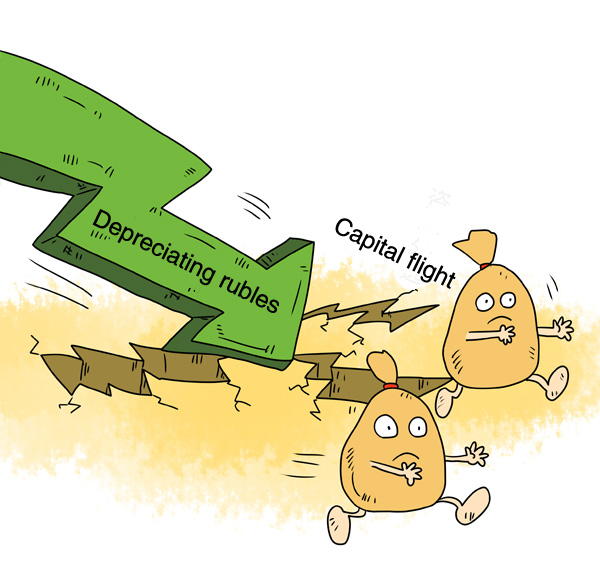BAI BAOLI and WANG XIAORUI: Russia’s economic woes show significance of SOEs

Recently, Russia has suffered from the depreciation of its currency, which may lead to a new wave of capital flight. (PHOTO: CFP)
With oil prices plummeting and the US dollar trading strong against the ruble, Russia is now beset by economic troubles. Its lessons with regard to state-owned assets are worth reflecting upon and learning from.
After the collapse of the Soviet Union in 1991, Boris Yeltsin, the first President of the Russian Federation, called for large-scale privatization of factories and land. However, this resulted in great damage to the Russian economy as well as threats to its national security and social stability.
From 1992 to 1996, there was a colossal loss of state-owned assets worth 9.5 quadrillion rubles. The advantaged heavy and military industries also saw a notable drop in competitiveness and the comprehensive national strength decreased too. Moreover, the gap between the rich and the poor further widened, and most residents were at risk of unemployment. In 1989, the GDP of Russia was more than twice that of China, but its economy was only one-third the size of China’s 10 years later.
Excessive privatization is one of the main reasons why Russia is vulnerable to sanctions imposed by other Western countries that threaten its economy and society. Because of the nature of the profit motive, large-scale outflow of private capital will occur when sanctions affect capital gains.
It has been estimated that there was an outflow of capital worth 70 billion dollars in the first quarter of 2014. Moreover, as the World Bank predicts, the capital withdrawn from Russia will total 150 billion dollars. However, if the state-owned enterprises (SOEs) accounted for a larger proportion of the Russian economy, the drain on tremendous state-owned assets could have been avoided, thus strengthening the ability to resist sanctions.
This indicates that powerful SOEs are essential to ensuring the safety of state-owned assets, preventing the outflow of capital, optimizing the allocation of national resources and withstanding the external impact of regional wars or military threats. China should be mindful of this and deepen its SOE reform by adhering to an economic system that focuses on public ownership as its central feature while allowing for the development of all types of ownership. In other words, such mixed-ownership under socialism with Chinese characteristics is the foundation and the fundamental goal of SOE reform.
On one hand, public ownership of the means of production constitutes the essential feature of socialist economy. The centrality of public ownership and SOE control over the lifelines of the nation economy are vital features that demonstrate the superiority of the socialist system, develop national economy and safeguard national security. On the other hand, mixed-ownership is also necessary for socialist market economy and is a prerequisite for diversified economic forms to adapt to the development of productive forces at different levels.
At the same time, it is important for SOEs to reform the property rights system without changing ownership. In this way, employees can be more involved in business decision-making, thus solving the macroeconomic problems at the source, such as unfair income distribution, insufficient effective demand and overreliance on foreign trade. In a word, it is essential to unswervingly develop the public sector of the economy while upholding mixed-ownership in order to achieve the goals of SOE reform.
Bai Baoli and Wang Xiaorui are from the Business School at Beijing Normal University.
